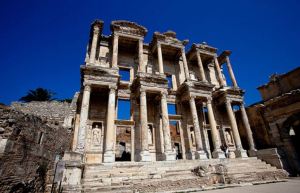by Eric Lawlor
Note: I checked this book out of the Spokane Public Library.
An Irishman goes to Turkey in search of the exotic. A Turk rejects exoticism as backwards and dirty.
- “You left England to find exoticism?” said Selim when I mentioned this. “You amaze me.”
- “Why?”
- “Isn’t London exotic? Buckingham Palace? Marble Arch? Big Ben?”
- “Big Ben is not exotic. Pashas waving scimitars–that’s exotic. Beautiful odalisques lounging on divans. The tinkle of camel bells. That’s what I’m here for. Oriental opulence. Decadent grandeur. All the things that make Turkey unique.”
- “Turkey is tired of being unique,” said Selim. “We want to raise our living standards. Exoticism! What a dumb reason to go anywhere.”
The Battle for his Soul

Lawlor quickly meets a second Turk who loves tradition as much as the first one loves smartphones. While Selim invites Eric to the Lion’s Club and to MacDonald’s, Ercuman introduces him to the bazaar and the kebab. At one point Ercuman says, “You know what we’re doing, don’t you? We’re battling for your soul.”
In terms of Eastern tradition vs. Western modernity, that ship has sailed. The Western soul–not just Lawlor’s, wants the exotic countries to which we travel to provide us with exoticism, entertainment, and above all, romance. (Lawlor even decries the fact that most circumcisions in Turkey are now performed with a laser, implying that rusty penknives by moonlight would suit him better.) We forget that many of the inhabitants of these countries desire cars and blue jeans and shopping malls every bit as much as we do, and deserve them equally.
The Good Bits

* Provides a bit of Turkey’s recent history, including a capsule bio of controversial modernizer Kemal Attaturk.
In the 1920s, this Turkish leader:
- banned the fez, the national headdress,
- made his countrymen assume family names,
- instituted the European weekend, (whatever that is),
- switched to the Roman alphabet (as a linguist, this is the one I find the most disagreeable),
- banned polygamy,
- gave women the vote, and
- made it possible for women to stand for parliament
Curiously, he didn’t ban the veil. Nor did he substantially change the Turkish male’s attitude toward women, one aspect of Turkish culture *I* feel is in sore need of modernization.

*Offers several humorous vignettes of common traveler experiences, including:
- tourists who consider themselves travelers,
- touts who won’t leave you alone,
- unwanted would-be sexual encounters where you are stupidly slow to figure out what is up (no pun intended), and
- the awkwardness of running into fellow countrymen when you don’t wish to speak to them.
*Several mouth-watering bits of Turkey gorgeously described.
*Points out the blind spots in Turkish culture; for example the government denies that the country contains almost 10 million Kurds, calling them “mountain Turks” instead. This ethnic group is banned from:
- speaking its own language,
- learning its own history, or
- singing its own songs.
To his credit, Lawlor does point out that the West hasn’t done much better with its minority groups, citing similar treatment of Native peoples in America and Australia.
The Dodgy Bits

In addition to a sort of a “look at these people, aren’t they quaint” voice throughout the book, there was one phrase which really got to me.
After a Turkish fragrance vendor sprays Lawlor with something that smells like oven cleaner, he writes: “Quite a pleasant smell, really, evoking as it did heath and home. There are those, perhaps who wouldn’t care to smell of oven cleaner, but I rather liked the idea. It had all the right connotations: Kinder, Kirche, Kuche.”
I nearly choked on my tea when I read that. As an exchange student in Germany, I was told that the most common connotations for that phrase, right or not, stem from Adolph Hitler. The Nazis used the phrase to reinforce the idea that Aryan women not worry their pretty little blonde heads about what might be happening to the Jews, but concern themselves solely with children, church, and baking cakes.

Despite it All
Having mentioned my philosophical issues with the book, I still enjoyed it! There are several landmarks in Turkey that I’d like to visit. I was surprised that the country has such high mountains, since I tend to think of all of the Middle East, Egypt, Turkey, etc. as being very flat. Although of course, there is Mount Ararat.
Three stars: I felt the book was able to overcome its shortcomings and still be of worth to readers.
